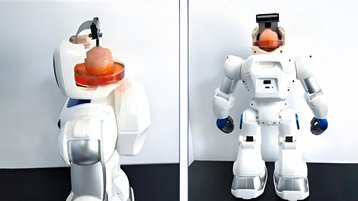Scientists in China have developed a ‘brain-on-chip’ system that combines lab-grown human brain matter with a neural interface chip to power a so-called ‘organoid’ robot.
It was developed by researchers at Tianjin University and the Southern University of Science and Technology.
The artificial brain that controls the system can apparently interact with external information by encoding, decoding, and responding to stimulus feedback when hooked up to electrode chips, with a report from state-owned Science and Technology Daily stating that the robot can be instructed to avoid obstacles, track, and grasp through what the news outlet described as “mind control.”
According to the report, the artificial brain has been grown in-vitro using stem cell technology, allowing scientists to create a brain-like organ out of simplified versions of brain tissue that have a similar function and structure to the brain. However, despite being grown in a lab, the Tianjin University research team said the brain still faces challenges such as low maturity and inadequate nutrient supply.
The technology is a form of brain-computer interface, which provides a direct communication link between electrical activity in the brain and an external device, such as a computer or robotic limb.
The most well-known example of the technology in recent years has been the work undertaken by Elon Musk's Neuralink. Despite the company being accused of killing at least 25 monkeys and subjecting others to “extreme suffering” during the animal-testing phase of the technology, in January 2024 Musk revealed that a Neuralink device had successfully been implanted in a human.







